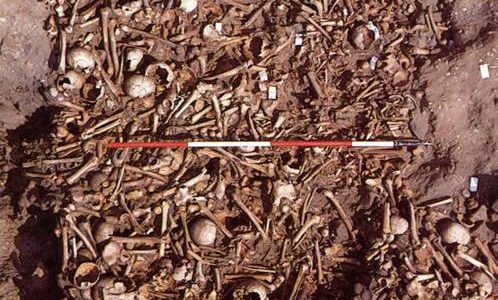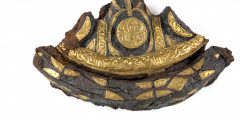Roderick Dale
View this author's profilePosts by Roderick Dale
Repton and the Legacy of the Viking Great Army
2018-02-23
By Catrine Jarman, University of Bristol In 873 the Viking Great Army attacked the monastery in Repton, forcing the Mercian king to flee the country and installing a puppet king in his place. 1100 years later, excavations led by archaeologists Martin Biddle and Birthe Kjølbye-Biddle at St Wystan’s Church in Repton in the 1970s and …
The Mythbusting Sword from the Bedale Hoard
2018-02-15
By Dr Sue Brunning Written sources from Viking period Britain create the impression that gold-hilted swords were typical weapons for high status warriors. Alfred the Great (871–99) described royal retainers wielding them; his father Æthelwulf (839–58) gifted one to the Holy See in Rome; and his grandson Eadred (946–59) bequeathed another. In the poem about …
Viking Age stone sculpture in the East Midlands
2018-02-02
By Paul Everson How do you make new discoveries of archaeological material dating from the Anglo-Scandinavian era in the East Midlands: the 9th, 10th and 11th centuries? And how do you contribute to scholarly and popular understanding of the Viking Age in England? For myself and my friend and long-term academic collaborator, David Stocker, the …
Pagans and Christians
2018-01-19
By Professor Lesley Abrams How helpful are the terms ‘pagan’ and ‘Christian’, or the concept of the ‘conversion to Christianity’, in explaining the political, religious, and cultural transformation experienced in Scandinavian England in the ninth and tenth centuries? The Viking armies who came to Britain were initially followers of potentially diverse forms of paganism, with …
Vikings in your Vocabulary
2018-01-05
By Dr Richard Dance What do English words like egg, husband, law, leg, sky and window have in common? And what about words used in the dialects of northern and eastern England, like lug (‘ear’), mun (‘shall, must’) and rammy (‘disgusting’)? The answer is that all these probably came into early English from Old Norse, …
Viking and Anglo-Saxon Stone Sculpture in Nottinghamshire and Derbyshire
2017-07-25
By Cassidy Croci Before the Great Heathen Army descended upon the East Midlands in the late ninth century, the area was known as Mercia, a kingdom controlled by the Anglo-Saxons. Anglo-Saxon stone sculpture is scattered across this landscape. On Monday 17th July members of the Centre for the Study of the Viking Age set out …



Recent Comments